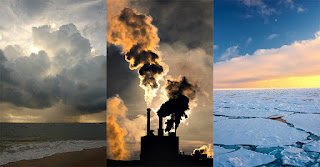 In "Cowspiracy",
Kip Andersen investigates the devastating effects of raising livestock and
animal agriculture. Raising livestock produces more greenhouse gasses than all methods of transportation combine. On average
livestock produce 150 billion gallons of methane per day, and methane is 86x more destructive to the atmosphere than carbon dioxide.
Animal agriculture is also the leading cause of resource consumption, including
deforestation.
In "Cowspiracy",
Kip Andersen investigates the devastating effects of raising livestock and
animal agriculture. Raising livestock produces more greenhouse gasses than all methods of transportation combine. On average
livestock produce 150 billion gallons of methane per day, and methane is 86x more destructive to the atmosphere than carbon dioxide.
Animal agriculture is also the leading cause of resource consumption, including
deforestation. The amount of water that is used by animal agriculture is staggeringly high, consuming 34 trillion gallons of water a year. The average person living in California uses 1500 gallons of water a day, half of it caused by the consumption of meat and dairy. Most of the water is used to grow the grain to feed cattle. It takes about 660 gallons of water to produce a quarter-pound hamburger, averaging out at about 2,500 gallons of water per pound of beef. In order to save water, we need to eat less meat, however, the government and environmental organizations do not want to address the impact of animal agriculture.
Animal agriculture produces 65% of the world's nitrous oxide, a gas with global warming potential that is 296 x greater than carbon dioxide per pound, yet all we hear about is the burning of fossil fuels. By 2040, due to the increased consumption of meat and dairy, the carbon dioxide levels are expected to raise 80% by animal emissions compared to 20% by energy emissions. A recent study shows that animal agriculture is responsible for 51% of human caused climate change, 30% of the water consumption, and 91% of the Amazon Rainforest destruction. It also occupies 45% of the earth's land and is the leading cause of ocean dead zones, habitat destruction and species extinction. Yet organizations meant to protect the earth do not have this as their main focus. Because of animal agriculture, we are in the middle of the biggest mass extinction in the past 65 million years.
Animal agriculture is the greatest source of water pollution. In the United States alone, 116,000 pounds of feces is produced every second, polluting the water. This is 130x more waste than the entire human population combined. This has caused 500 nitrogen-flooded dead zones in our oceans, about 95,000 square miles of lifeless ocean. Currently, 75% of the world's fisheries are over exploited, fully exploited, or significantly depleted due to overfishing. Approximately 28 billion animals are pulled out of the oceans annually, with no chance to recover. If changes are not made, scientists predict fishless oceans by 2048.
Because of animal agriculture, our rainforests, which are basically the planets lungs, are being destroyed at a rapid rate, one acre every second. Every day, 100 plant, animal and insect species are lost. While palm oil production is responsible for 26 million acres, animal agriculture is responsible for 136 million acres. There are people willing to speak up, but many people are afraid in fear of being shot in the head, like Sister Dorothy Stang. At least 1,100 activists have been killed in Brazil within the last 20 years.
Most people blame the earth's problems on overpopulation, but really, it's really a people-eating animal population problem. There are 7 billion people on this planet, and they consume 5.2 billion gallons of water and 21 billion pounds of food, but there are 70,000,000,000 animals raised for food that consume 45 billion gallons of water and 135 billion pounds of food. It is not possible to feed the world meat and dairy in a sustainable way. There is too high of a demand, and it is only going to increase as the population continues to grow exponentially.
To be sustainable, a plant-based diet is recommended; it uses one-twentieth of the land. Growing plants is efficient. To feed one person on a plant based diet for a year required 1/6th of an acre of land. Being vegetarian requires 3x that, and meat requires 18x that. On an acre and a half of land, 37,000 pounds of vegetables can be produced versus 375 pounds of meat on that same about of land. In addition to being more efficient, carbon dioxide levels would drop. Going vegan, in one year, one person can save 108 tons of carbon dioxide emissions; this is more than going solar or driving a hybrid car. By going vegan, everyday a person saves 1100 gallons of water, 45 pounds of grain, 30 square feet of forest, 10 pounds of carbon dioxide, and 1 animal’s life! Also, ocean populations would return, land would return, the air would be cleaner, and climate change would reverse. It is the most powerful thing a person can do to save the planet!



